Related Research Articles

In military telecommunications, electronic support (ES) or electronic support measures (ESM) gather intelligence through passive "listening" to electromagnetic radiations of military interest. They are an aspect of electronic warfare involving actions taken under direct control of an operational commander to detect, intercept, identify, locate, record, and/or analyze sources of radiated electromagnetic energy for the purposes of immediate threat recognition or longer-term operational planning. Thus, electronic support provides a source of information required for decisions involving electronic protection (EP), electronic attack (EA), avoidance, targeting, and other tactical employment of forces. Electronic support data can be used to produce signals intelligence (SIGINT), communications intelligence (COMINT) and electronics intelligence (ELINT).
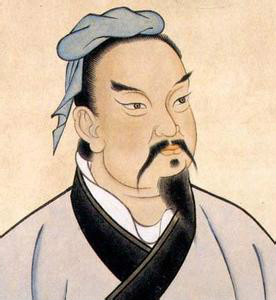
Sun Tzu was a Chinese military general, strategist, philosopher, and writer who lived during the Eastern Zhou period. Sun Tzu is traditionally credited as the author of The Art of War, an influential work of military strategy that has affected both Western and East Asian philosophy and military thinking. It focuses much more on alternatives to battle and even to war than on war itself, such as stratagem, delay, the use of spies, the making and keeping of alliances, the uses of deceit, and a willingness to submit, at least temporarily, to more powerful foes. Sun Tzu is revered in Chinese and East Asian culture as a legendary historical and military figure. His birth name was Sun Wu and he was known outside of his family by his courtesy name Changqing. The name Sun Tzu by which he is more popularly known is an honorific which means "Master Sun".
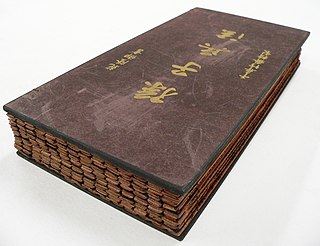
The Art of War is an ancient Chinese military treatise dating from the Late Spring and Autumn Period. The work, which is attributed to the ancient Chinese military strategist Sun Tzu, is composed of 13 chapters. Each one is devoted to a different set of skills or art related to warfare and how it applies to military strategy and tactics. For almost 1,500 years it was the lead text in an anthology that was formalized as the Seven Military Classics by Emperor Shenzong of Song in 1080. The Art of War remains the most influential strategy text in East Asian warfare and has influenced both Far Eastern and Western military thinking, business tactics, legal strategy, lifestyles and beyond.

Knowledge management (KM) is the collection of methods relating to creating, sharing, using and managing the knowledge and information of an organization. It refers to a multidisciplinary approach to achieve organisational objectives by making the best use of knowledge.
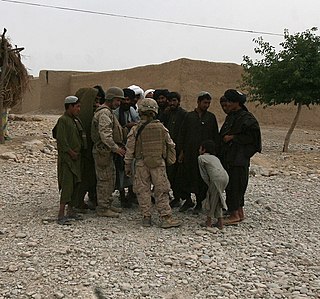
Military intelligence is a military discipline that uses information collection and analysis approaches to provide guidance and direction to assist commanders in their decisions. This aim is achieved by providing an assessment of data from a range of sources, directed towards the commanders' mission requirements or responding to questions as part of operational or campaign planning. To provide an analysis, the commander's information requirements are first identified, which are then incorporated into intelligence collection, analysis, and dissemination.
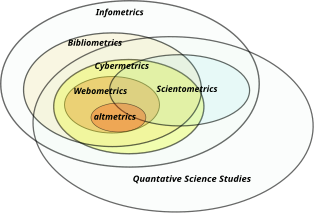
Information science is an academic field which is primarily concerned with analysis, collection, classification, manipulation, storage, retrieval, movement, dissemination, and protection of information. Practitioners within and outside the field study the application and the usage of knowledge in organizations in addition to the interaction between people, organizations, and any existing information systems with the aim of creating, replacing, improving, or understanding information systems.

The OODA loop is the cycle observe–orient–decide–act, developed by military strategist and United States Air Force Colonel John Boyd. Boyd applied the concept to the combat operations process, often at the operational level during military campaigns. It is now also often applied to understand commercial operations and learning processes. The approach explains how agility can overcome raw power in dealing with human opponents. It is especially applicable to cyber security and cyberwarfare.
Knowledge workers are workers whose main capital is knowledge. Examples include programmers, physicians, pharmacists, architects, engineers, scientists, design thinkers, public accountants, lawyers, editors, and academics, whose job is to "think for a living".

In the field of military theory, the operational level of war represents the level of command that connects the details of tactics with the goals of strategy.
An informationist provides research and knowledge management services in the context of clinical care or biomedical research.
The chief networking officer (CNO) is a business networking position in a company or organization. The term refers less commonly to a technical executive position in the computer industry.

Command and control is a "set of organizational and technical attributes and processes ... [that] employs human, physical, and information resources to solve problems and accomplish missions" to achieve the goals of an organization or enterprise, according to a 2015 definition by military scientists Marius Vassiliou, David S. Alberts, and Jonathan R. Agre. The term often refers to a military system.
The information audit (IA) extends the concept of auditing from a traditional scope of accounting and finance to the organisational information management system. Information is representative of a resource which requires effective management and this led to the development of interest in the use of an IA.

Lorcan Dempsey is a vice president and is Chief Strategist of OCLC.
A system is a group of interacting or interrelated elements that act according to a set of rules to form a unified whole. A system, surrounded and influenced by its environment, is described by its boundaries, structure and purpose and expressed in its functioning. Systems are the subjects of study of systems theory and other systems sciences.
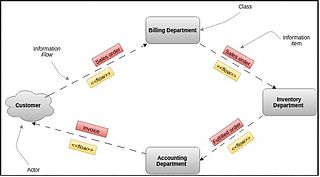
An information flow diagram (IFD) is a diagram that shows how information is communicated from a source to a receiver or target, through some medium. The medium acts as a bridge, a means of transmitting the information. Examples of media include word of mouth, radio, email, etc. The concept of IFD was initially used in radio transmission. The diagrammed system may also include feedback, a reply or response to the signal that was given out. The return paths can be two-way or bi-directional: information can flow back and forth.

African Journals OnLine (AJOL) is a South African non-profit organisation dedicated to improving the online visibility of and access to the published scholarly research of African-based academics. It is headquartered in Grahamstown. By using the internet as a gateway, AJOL aims to enhance conditions for African learning to be translated into African development.

An academic discipline or academic field is a subdivision of knowledge that is taught and researched at the college or university level. Disciplines are defined and recognized by the academic journals in which research is published, and the learned societies and academic departments or faculties within colleges and universities to which their practitioners belong. Academic disciplines are conventionally divided into the humanities, including language, art and cultural studies, and the scientific disciplines, such as physics, chemistry, and biology; the social sciences are sometimes considered a third category.
Philippe N. Baumard graduated from the University of Aix-Marseille II, and Paris Dauphine University. Philippe Baumard is an organizational scientist who has held visiting professorships at New York University from 1997 to 1998, University of California, Berkeley from 2004 to 2007, Stanford University from 2008 to 2010. He is currently professor at the French National Conservatory of Arts and Crafts (CNAM), associate-researcher at École Polytechnique's Chair on Innovation & Regulation, Paris, and president of the scientific council of France's High Council for Strategic Education and Research
A principal warfare officer (PWO), is one of a number of warfare branch specialist officers.
References
- ↑ Angela Abell, Nigel Oxbrow (2001), Competing with knowledge: the information professional in the knowledge management age, Library Association, p. 171, ISBN 9781856043397
- ↑ George Plosker (March 1, 2004), Introducing the information strategist, Online
- ↑ John Arquilla, Douglas A. Borer (2007), Information strategy and warfare: a guide to theory and practice, Routledge, ISBN 9780415771245